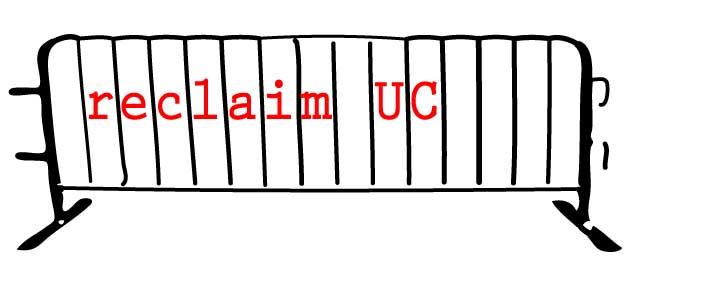
(photo by Andrew Stern)
By Zachary Levenson
On November 18, University of California (UC), Davis police attempted to raid a student occupation on the campus. When a line of UC Davis students refused to move out of the way, Lieutenant John Pike covered their faces with military-grade pepper spray. He returned for a second round, making sure to coat everyone’s eyes and throats.
“When students covered their eyes with their clothing, police forced open their mouths and pepper-sprayed down their throats. Several of these students were hospitalized. Others are seriously injured. One of them, forty-five minutes after being pepper-sprayed down his throat, was still coughing up blood,” described Assistant Professor of English at UC Davis Nathan Brown.[1]
Within 24 hours, a video of the incident had gone viral on YouTube, and the media feigned outrage. UC Davis chancellor Linda Katehi apologized for the incident, and UC president Mark Yudof announced a task force to address the police violence. UC Berkeley chancellor Robert Birgeneau was also forced to apologize after campus police clubbed UC Berkeley students and faculty while they also nonviolently defended an encampment on their campus two weeks before.
This is hardly the first time that California students have faced brutal police repression in recent years. This sort of authorized police violence has been a constant feature of campus administrations’ response to students as they have continuously mobilized against the privatization of their public universities over the past two years.
***
Early in the morning of November 20, 2009, 43 students from the UC Berkeley occupied Wheeler Hall, the building with the most classrooms on campus. When police arrived a couple of hours before classes began for the day, they found the doors barricaded and a small contingent of supporters gathered outside. Within a few hours campus unions were picketing, and students and workers had surrounded the building, chanting in solidarity. By midday, the number of supporters outside Wheeler Hall had grown to over 2,000, now actively defending the occupation in an impassioned standoff with hundreds of riot cops sent in to enforce order. Hanging from a second floor window was a spray-painted banner reading, “32% HIKE, 1900 LAYOFFS,” and the word “CLASS,” circled with a line through it. Purportedly in response to state funding retrenchment, the UC Regents had approved a 32% tuition hike for UC students across the state the day before. Students were livid.
In fall 2009, across the state, students launched dozens of occupations, sit-ins, marches, rallies, and blockades against the tuition hike and austerity measures. The police responded with repression, using batons, rubber bullets, tear gas, and even Tasers. During the Wheeler Hall occupation demonstrations, one student was shot in the stomach with a rubber bullet at point-blank range, another ended up in the hospital after her fingers were nearly amputated by a police baton, and dozens reported being beaten.
“Behind every fee increase, a line of riot cops,” read a graduate student nearly two weeks later, standing atop a chair, at a forum organized by the UC student government in conjunction with the UC Berkeley Police Department (UCPD). “The privatization of the UC system and the impoverishment of student life, the UC administration’s conscious choice to shift its burden of debt onto the backs of its students—these can be maintained only by way of police batons, Tasers, barricades and pepper spray. These are two faces of the same thing.”[2]
When he finished reading the statement, the students rose to their feet and followed him out of the room.







